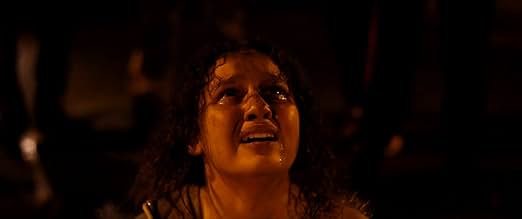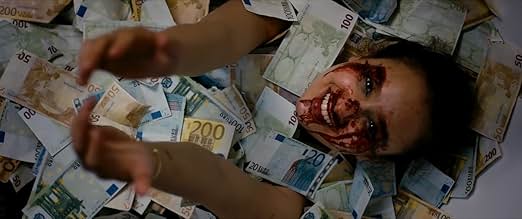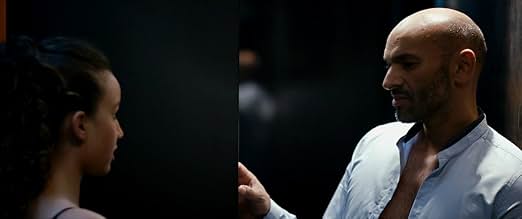Divines
- 2016
- 1h 45min
VALUTAZIONE IMDb
7,3/10
10.846
LA TUA VALUTAZIONE
Un'adolescente di strada di una famiglia disfunzionale di una banlieue a Parigi, si imbatte in una giovane ballerina che stravolge la sua vita.Un'adolescente di strada di una famiglia disfunzionale di una banlieue a Parigi, si imbatte in una giovane ballerina che stravolge la sua vita.Un'adolescente di strada di una famiglia disfunzionale di una banlieue a Parigi, si imbatte in una giovane ballerina che stravolge la sua vita.
- Regia
- Sceneggiatura
- Star
- Premi
- 16 vittorie e 13 candidature totali
Kévin Mischel
- Djigui
- (as Kevin Mishel)
Maryama Soumare
- Madame Camara
- (as Mariama Soumaré)
Samir Zrouki
- Gervais
- (as Samir Zbrouki)
Recensioni in evidenza
This is not a boy-meets-girl story. This is a heart-wrenching and breathtaking story, with some of the best acting I've seen all year. An unparalleled coming of age tale full of beauty and sadness and truth. This is worth every single minute and then some. An absolute must watch-- you won't regret it.
The director, like the main character, wants success. And she did it. Only by opening the door out not the door in. She got the big prize. And that is about it. The bureaucratic machine has eaten her whole. Don't get me wrong. I hope I am wrong.
I have seen comments about the rush ending. The ending is not rushed. It is a natural consequence. And the whole script is made following a opera or simple drama. Only both classical drama and the opera are the ways white Europeans see as the highest refinement in entertainment. The film was made to please the eyes and the minds of old f*rts that fill the juries and the commissions that are specialized in turning the taxpayer money into alms for those who know how to please.
There are social statements, but they are void and not offensive, like the small exercise in accountancy at the beginning: "how much you make? 1000? The rent is 800. Pay the food and at the end of the month you have nothing." It is true. It is said. Yet it says nothing about the system. Police brutality is never touched. And the final confrontation with the cops is a ballet rehearsal.
I have loved how expressive and full of life Oulaya Amamra can be. But her character has a split personality. In a country where when you can boil an egg on the asphalt the women still wear a bra and two tank tops, she can go to a club with no bra and a generous cleavage. She can in one scene have a hard time coping with the promiscuity of her mother pointing out her decision to fight that, and in another scene go lure a violent man with sex.
In the end there is no story. What does the character want? That's easy. Money. But money to do what? And here is where the director-writer fails. All these are stock characters from television. The youngster with no future. The girls who sell a vagina hoping for the better. The opportunist drug peddler. The unfit mother who god forbid has sex with more than her lawfully given husband and does not read books on parenting. All these are silhouettes on TV. And the story is not on screen but in the white old man's mind, the one who handles the taxpayer money. Sure, there are drugs in the movie. But these are only a device. The stereotype of the easy money. The drugs are not escapism from the ugly world outside, as there is no ugly world outside. The high rise building is only the backdrop to remind the viewer of the 5 o'clock news.
It could have been a 100 minutes story on a budget with only Oulaya Amamra, Déborah Lukumuena and Jisca Kalvanda. Without state money it could have been done precisely a decade ago when the director's association was made. But that association is another way to make a living dancing with the state and tearing the stories apart while moving from place to place to please white old men in power. Of course Cannes wouldn't have looked at such films. But who knows? In that dreamt reality 2016 would have been the production year of a third or even a fourth feature movie on a budget.
Yamina Benguigui has started much better. Stronger films, more accessible stories. And today she is yet another bureaucrat managing other people's money. She has more than one boss and she has to please to receive the money she hands down. Her last work was for TV and that was 7 years ago. And she is not the only one eaten by the machine.
A sad broken story made into a ladder.
Contact me with Questions, Comments or Suggestions ryitfork @ bitmail.ch
I have seen comments about the rush ending. The ending is not rushed. It is a natural consequence. And the whole script is made following a opera or simple drama. Only both classical drama and the opera are the ways white Europeans see as the highest refinement in entertainment. The film was made to please the eyes and the minds of old f*rts that fill the juries and the commissions that are specialized in turning the taxpayer money into alms for those who know how to please.
There are social statements, but they are void and not offensive, like the small exercise in accountancy at the beginning: "how much you make? 1000? The rent is 800. Pay the food and at the end of the month you have nothing." It is true. It is said. Yet it says nothing about the system. Police brutality is never touched. And the final confrontation with the cops is a ballet rehearsal.
I have loved how expressive and full of life Oulaya Amamra can be. But her character has a split personality. In a country where when you can boil an egg on the asphalt the women still wear a bra and two tank tops, she can go to a club with no bra and a generous cleavage. She can in one scene have a hard time coping with the promiscuity of her mother pointing out her decision to fight that, and in another scene go lure a violent man with sex.
In the end there is no story. What does the character want? That's easy. Money. But money to do what? And here is where the director-writer fails. All these are stock characters from television. The youngster with no future. The girls who sell a vagina hoping for the better. The opportunist drug peddler. The unfit mother who god forbid has sex with more than her lawfully given husband and does not read books on parenting. All these are silhouettes on TV. And the story is not on screen but in the white old man's mind, the one who handles the taxpayer money. Sure, there are drugs in the movie. But these are only a device. The stereotype of the easy money. The drugs are not escapism from the ugly world outside, as there is no ugly world outside. The high rise building is only the backdrop to remind the viewer of the 5 o'clock news.
It could have been a 100 minutes story on a budget with only Oulaya Amamra, Déborah Lukumuena and Jisca Kalvanda. Without state money it could have been done precisely a decade ago when the director's association was made. But that association is another way to make a living dancing with the state and tearing the stories apart while moving from place to place to please white old men in power. Of course Cannes wouldn't have looked at such films. But who knows? In that dreamt reality 2016 would have been the production year of a third or even a fourth feature movie on a budget.
Yamina Benguigui has started much better. Stronger films, more accessible stories. And today she is yet another bureaucrat managing other people's money. She has more than one boss and she has to please to receive the money she hands down. Her last work was for TV and that was 7 years ago. And she is not the only one eaten by the machine.
A sad broken story made into a ladder.
Contact me with Questions, Comments or Suggestions ryitfork @ bitmail.ch
The lead characterization is raw,pure & beautiful!!! The friendshops, relations & portrayed well. How the choices you make define your path is shown well!!! The dancer works hard to make a different path in life while the girl choses a short cut for quick success but loses the most important person in her life!!! What a direction!!! The lead actress is so powerful in her acting!!!
Houda Benyamina's stunning debut Divines immediately reminded me of Céline Sciamma's Girlhood. The two films follow similar protagonists, both 16 year old girls growing up in the rough banlieu of Paris. But while Girlhood was the story of a girl growing up in the ghetto told by someone who wasn't from that area, Benyamina is someone who came from those places and understands it intimately and as a result her film feels more vibrant and multi- dimensional.
Divines is focused on Dounia (Oulaya Amamra, phenomenal), a plucky young teen who lives in makeshift tent camp with her mother who drinks too much and sleeps around. As a result Dounia had to grow up fast. Like a teenage Robin Hood she shoplifts from grocery stores bringing basic necessities to her neighbours and friends. While at school she is treated with condescension by a teacher, trying to inform her how to behave in order to get the low wage entry level positions she'll probably be doomed to occupying her whole life and decides that that isn't for her. Instead, thinking only of money, she hustles her way into getting a job with Rebecca, the neighbourhood drug dealer.
Now in another movie (like Girlhood) this would be represented in a very moralistic fashion but Benyamina shows how for someone like Dounia, working her way up to drug dealer is probably the quickest, most interesting way for her to achieve her goals. And while Dounia does some morally dubious things the movie understands why and never judges her.
Benyamina also has some fun playing with her characters and her style and there are some dance and fantasy sequences that make this play like a ghetto fairy tale. But she never forgets her serious side either. Divines is ultimately a film about forgotten people trying to make it anyway they can and Benyamina makes sure that you remember them.
Divines is focused on Dounia (Oulaya Amamra, phenomenal), a plucky young teen who lives in makeshift tent camp with her mother who drinks too much and sleeps around. As a result Dounia had to grow up fast. Like a teenage Robin Hood she shoplifts from grocery stores bringing basic necessities to her neighbours and friends. While at school she is treated with condescension by a teacher, trying to inform her how to behave in order to get the low wage entry level positions she'll probably be doomed to occupying her whole life and decides that that isn't for her. Instead, thinking only of money, she hustles her way into getting a job with Rebecca, the neighbourhood drug dealer.
Now in another movie (like Girlhood) this would be represented in a very moralistic fashion but Benyamina shows how for someone like Dounia, working her way up to drug dealer is probably the quickest, most interesting way for her to achieve her goals. And while Dounia does some morally dubious things the movie understands why and never judges her.
Benyamina also has some fun playing with her characters and her style and there are some dance and fantasy sequences that make this play like a ghetto fairy tale. But she never forgets her serious side either. Divines is ultimately a film about forgotten people trying to make it anyway they can and Benyamina makes sure that you remember them.
Selling drugs, hoping to get rich, stealing, fighting, and romance, there are a lot of movies made on this theme. Nothing new here just a different context and location.
Lo sapevi?
- QuizOulaya Amamra is director Houda Benyamina's little sister.
- ConnessioniReferences Hot Fuzz (2007)
- Colonne sonoreNisi dominus, RV 608: Cum Dederit Dilectis Suis
Composed by Antonio Vivaldi
by Jakub Burzynski & La Tempesta
© 2016 Easy Tiger
I più visti
Accedi per valutare e creare un elenco di titoli salvati per ottenere consigli personalizzati
- How long is Divines?Powered by Alexa
Dettagli
Botteghino
- Budget
- 2.440.000 € (previsto)
- Lordo in tutto il mondo
- 2.297.612 USD
- Tempo di esecuzione
- 1h 45min(105 min)
- Colore
- Proporzioni
- 2.35 : 1
Contribuisci a questa pagina
Suggerisci una modifica o aggiungi i contenuti mancanti

![Guarda Bande-annonce [OV]](https://m.media-amazon.com/images/M/MV5BMjVkMzM5YWYtMWU3My00YWUzLTgyNTYtN2I4ZDVmN2EzZDAwXkEyXkFqcGdeQXRyYW5zY29kZS13b3JrZmxvdw@@._V1_QL75_UX500_CR0)










